Preface
In the 27 years since Worth Publishers invited me (David Myers) to write this book, so much has changed in the world, in psychology, and within these course resources, across ten editions. With this edition, I continue as lead author while beginning a gradual, decade-
Yet across nearly three decades of Exploring Psychology there has also been a stability of purpose: to merge rigorous science with a broad human perspective that engages both mind and heart. We aim to offer a state-
We are enthusiastic about psychology and its applicability to our lives. Psychological science has the potential to expand our minds and enlarge our hearts. By studying and applying its tools, ideas, and insights, we can supplement our intuition with critical thinking, restrain our judgmentalism with compassion, and replace our illusions with understanding. By the time students complete this guided tour of psychology, they will also, we hope, have a deeper understanding of our moods and memories, about the reach of our unconscious, about how we flourish and struggle, about how we perceive our physical and social worlds, and about how our biology and culture in turn shape us. (See TABLE 1 and TABLE 2.)
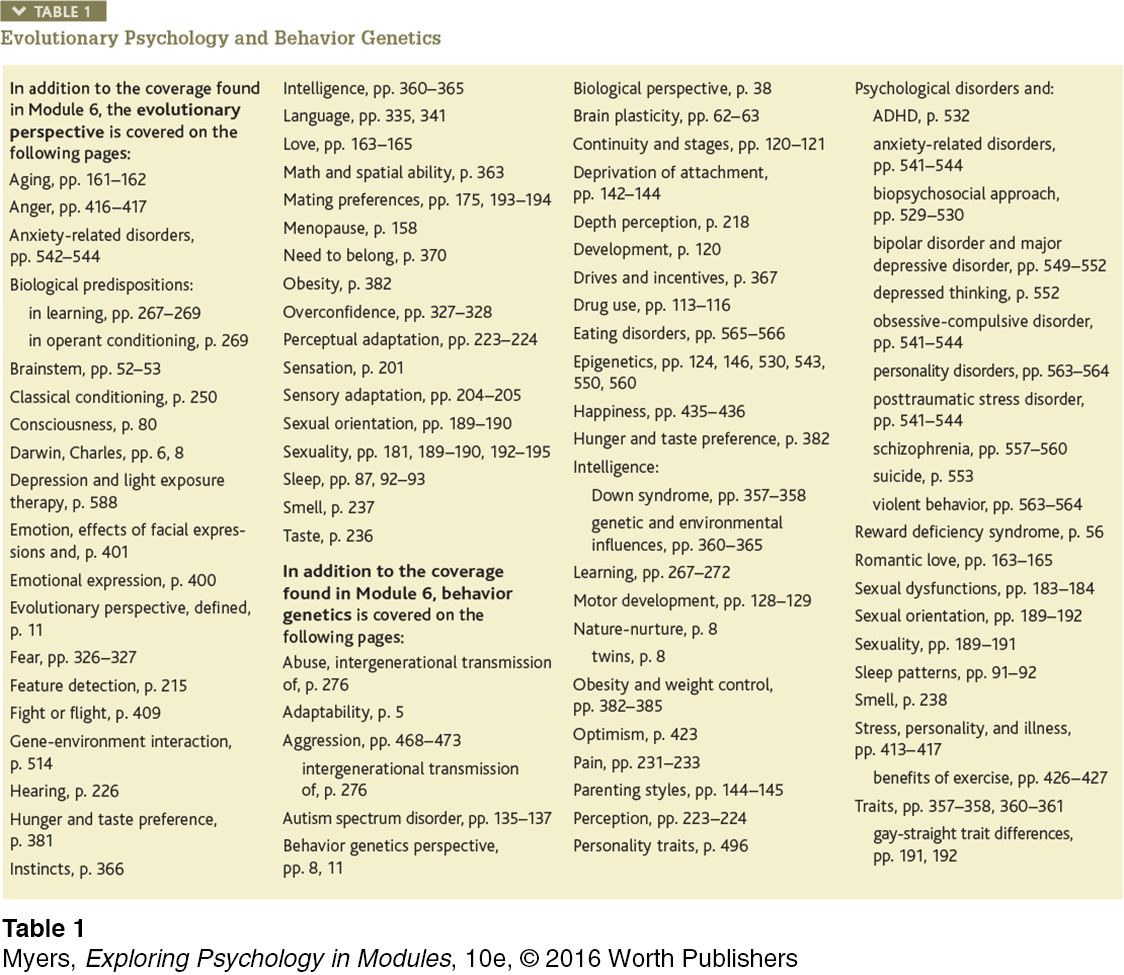
Believing with Thoreau that “anything living is easily and naturally expressed in popular language,” we seek to communicate psychology’s scholarship with crisp narrative and vivid storytelling. We hope to tell psychology’s story in a way that is warmly personal as well as rigorously scientific. We love to reflect on connections between psychology and other realms, such as literature, philosophy, history, sports, religion, politics, and popular culture. And we love to provoke thought, to play with words, and to laugh. For his pioneering 1890 Principles of Psychology, William James sought “humor and pathos.” And so do we.
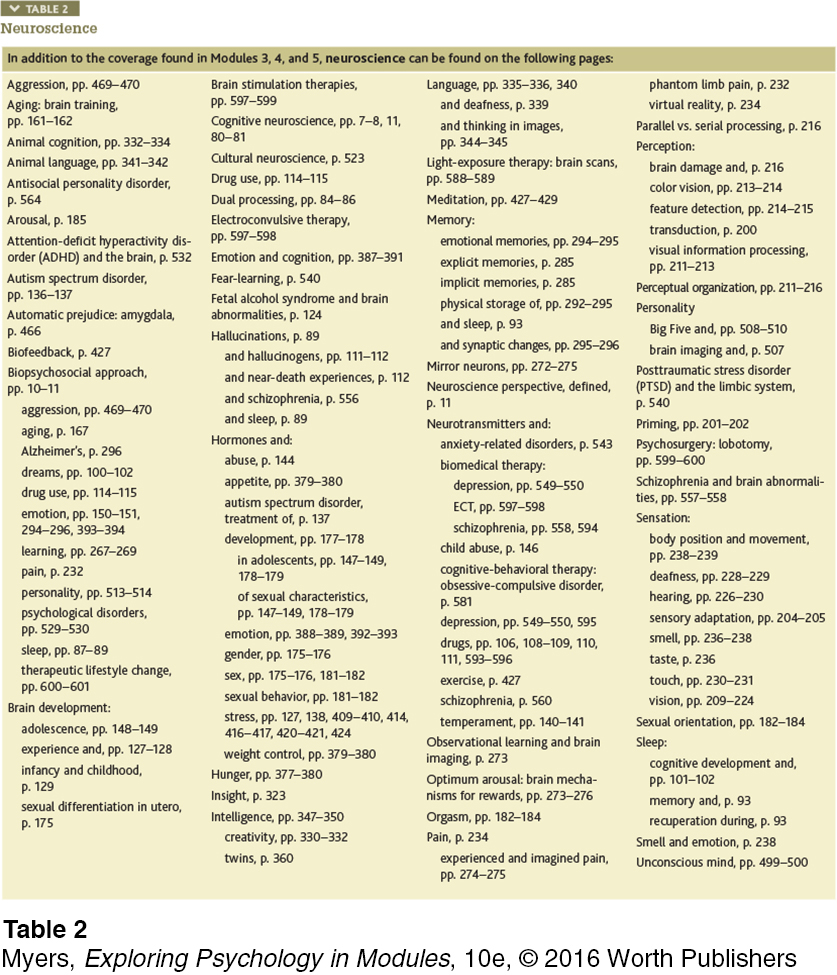
We are grateful for the privilege of assisting with the teaching of this mind-
Creating this book is a team sport. Like so many human achievements, it reflects a collective intelligence. Woodrow Wilson spoke for us: “I not only use all the brains I have, but all I can borrow.” The thousands of instructors and millions of students across the globe who have taught or studied (or both!) with our books have contributed immensely to their development. Much of this contribution has occurred spontaneously, through correspondence and conversations. For this edition, we also formally involved dozens of researchers, teaching psychologists, and students in our efforts to gather accurate and up-
New Co-Author

For this edition I [DM] welcome my new co-
Why a Modular Book?
This 45-
Have we not all heard the familiar student complaint: “The chapters are too long!” A text’s typical 30-
to 50- page chapter cannot be read in a single sitting before the eyes grow weary and the mind wanders. So, why not parse the material into readable units? Ask your students whether they would prefer a 600- page book to be organized as fifteen 40- page chapters or as forty 15- page chapters. You may be surprised at their overwhelming support for shorter chapters. Indeed, students digest material better when they process it in smaller chunks— as spaced rather than massed practice. - Page xix
I have equally often heard from instructors bemoaning the fact that they “just can’t get to everything” in the book. Sometimes instructors want to cover certain sections in a traditional, long chapter but not others. For example, in the typical Consciousness chapter, someone may want to cover Sleep and Dreams but not Drugs. In Exploring Psychology, Tenth Edition in Modules, instructors could easily choose to cover Module 8, Sleep and Dreams, but not Module 9, Drugs and Consciousness.
How Is This Different From Exploring Psychology, Tenth Edition?
The primary differences between this book and Exploring Psychology, tenth edition, are organization and module independence.
Organization
The book really IS Exploring Psychology, tenth edition—
The Modules Are Independent
Each module in this book is self-
What Else Is New Since Exploring Psychology, Ninth Edition in Modules?
This tenth edition is the most carefully reworked and extensively updated of all the revisions to date. This new edition features improvements to the organization and presentation, especially to our system of supporting student learning and remembering. And we offer the exciting new Immersive Learning: How Would You Know? feature in LaunchPad, engaging students in the scientific process.
“Immersive Learning: How Would You Know?” Research Activities
We [ND and DM] created these online activities to engage students in the scientific process, showing them how psychological research begins with a question, and how key decision points can alter the meaning and value of a psychological study. In a fun, interactive environment, students learn about important aspects of research design and interpretation, and develop scientific literacy and critical thinking skills in the process. I [ND] have enjoyed taking the lead on this project and sharing my research experience and enthusiasm with students. Topics include: “How Would You Know If a Cup of Coffee Can Warm Up Relationships?,” “How Would You Know If People Can Learn to Reduce Anxiety?,” and “How Would You Know If Schizophrenia Is Inherited?”
New Visual Scaffolding Module Group Openers
We were aware that students often skip over a text’s typical two-
Hundreds of New Research Citations
Our ongoing scrutiny of dozens of scientific periodicals and science news sources, enhanced by commissioned reviews and countless e-
Reorganized Modules
In addition to the new research activities, visual scaffolding openers, and updated coverage, we’ve introduced the following organizational changes:
Module 2, Research Strategies, now offers greater emphasis on designing psychological studies, and on psychology’s research ethics.
The Social Psychology modules now precedes the Personality modules.
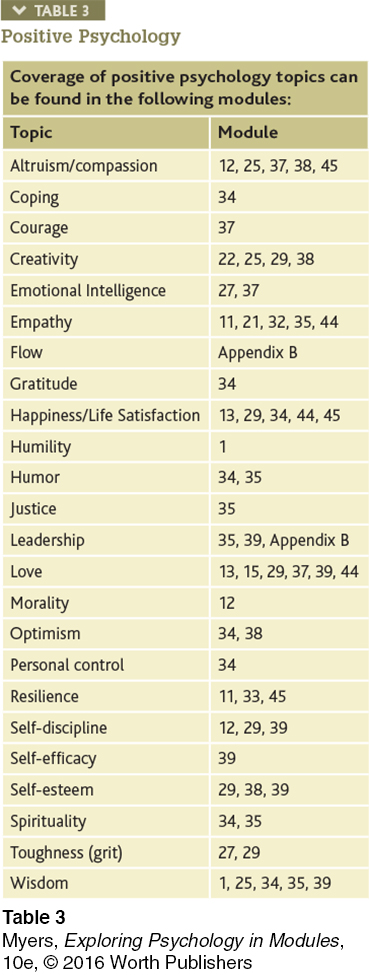
LaunchPad for Exploring Psychology, Tenth Edition in Modules
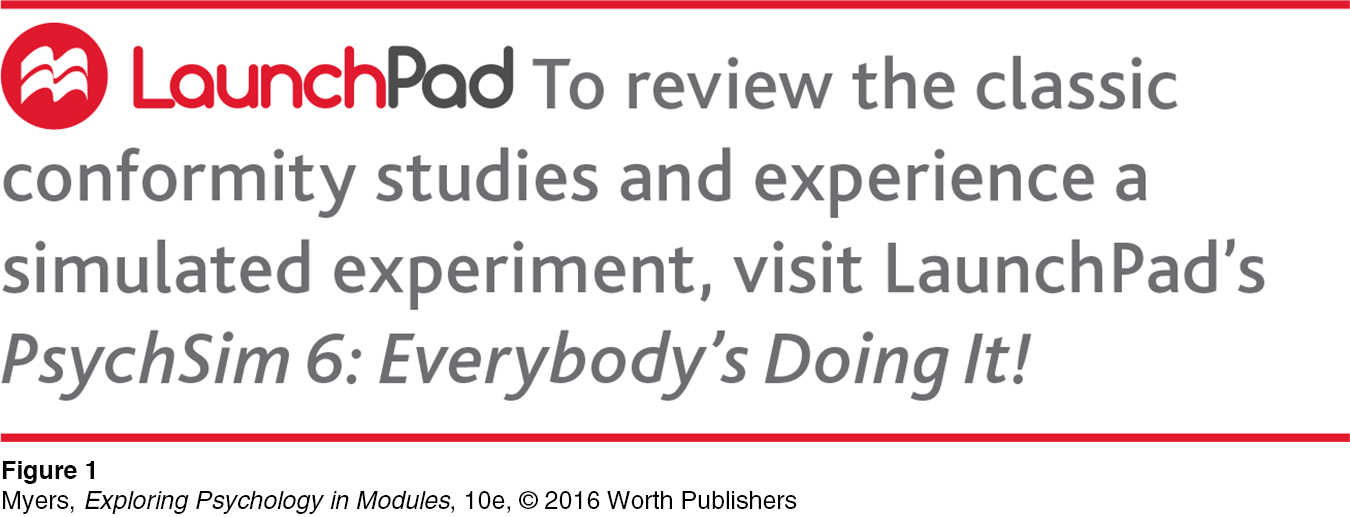
Built to solve key challenges in this course, LaunchPad gives students everything they need to prepare for class and exams, while giving instructors everything they need to quickly set up a course, shape the content to their syllabus, craft presentations and lectures, assign and assess homework, and guide the progress of individual students and the class as a whole. LaunchPad for Exploring Psychology, Tenth Edition in Modules includes LearningCurve formative assessment, and NEW Immersive Learning: How Would You Know? activities, PsychSim 6 tutorials, and Assess Your Strengths projects. (For details, see p. xxix and http:/
For this new edition, you will see that we’ve offered callouts from the text pages to especially pertinent, helpful resources from LaunchPad. (See FIGURE 1 for a sample.)
What Continues?
Eight Guiding Principles
Despite all the exciting changes, this new edition retains its predecessors’ voice, as well as much of the content and organization. It also retains the goals—
Facilitating the Learning Experience
To teach critical thinking By presenting research as intellectual detective work, we illustrate an inquiring, analytical mind-
set. Whether students are studying development, cognition, or social behavior, they will become involved in, and see the rewards of, critical reasoning. Moreover, they will discover how an empirical approach can help them evaluate competing ideas and claims for highly publicized phenomena— ranging from ESP and alternative therapies to group differences in intelligence and repressed and recovered memories. To integrate principles and applications Throughout—
by means of anecdotes, case histories, and the posing of hypothetical situations— we relate the findings of basic research to their applications and implications. Where psychology can illuminate pressing human issues— be they racism and sexism, health and happiness, or violence and war— we have not hesitated to shine its light. To reinforce learning at every step Everyday examples and rhetorical questions encourage students to process the material actively. Concepts presented earlier are frequently applied, and reinforced. For instance, in Module 2, students learn that much of our information processing occurs outside of our conscious awareness. Ensuing modules drive home this concept. Numbered Learning Objective Questions and Retrieve It self-
tests throughout each module, a Review and Experience the Testing Effect self- test at the end of each main text section, and a pop- up glossary help students learn and retain important concepts and terminology.
Demonstrating the Science of Psychology
To exemplify the process of inquiry We strive to show students not just the outcome of research, but how the research process works. Throughout, we try to excite the reader’s curiosity. We invite readers to imagine themselves as participants in classic experiments. Several modules introduce research stories as mysteries that progressively unravel as one clue after another falls into place. Our new “Immersive Learning: How Would You Know?” activities in LaunchPad encourage students to think about research questions and how they may be studied effectively.
To be as up-
to- Few things dampen students’ interest as quickly as the sense that they are reading stale news. While retaining psychology’s classic studies and concepts, we also present the discipline’s most important recent developments. In this edition, 701 references are dated 2013–date as possible 2015. Likewise, new photos and everyday examples are drawn from today’s world. - Page xxii
To put facts in the service of concepts Our intention is not to fill students’ intellectual file drawers with facts, but to reveal psychology’s major concepts—
to teach students how to think, and to offer psychological ideas worth thinking about. In each module, we place emphasis on those concepts we hope students will carry with them long after they complete the course. Always, we try to follow Albert Einstein’s purported dictum that “everything should be made as simple as possible, but not simpler.” Learning Objective Questions, Retrieve It questions, and Experience the Testing Effect questions in each module help students learn and retain the key concepts.
Promoting Big Ideas and Broadened Horizons
To enhance comprehension by providing continuity We often present concepts with a significant issue or theme that links subtopics, forming a thread that ties ideas together. The Learning modules convey the idea that bold thinkers can serve as intellectual pioneers. The Thinking, Language, and Intelligence modules raise the issue of human rationality and irrationality. The Psychological Disorders modules convey empathy for, and understanding of, troubled lives. Other threads, such as cognitive neuroscience, dual processing, and cultural and gender diversity, weave throughout the whole book, and students hear a consistent voice.
To convey respect for human unity and diversity Throughout the book, readers will see evidence of our human kinship—
our shared biological heritage, our common mechanisms of seeing and learning, hungering and feeling, loving and hating. They will also better understand the dimensions of our diversity— our individual diversity in development and aptitudes, temperament and personality, and disorder and health; and our cultural diversity in attitudes and expressive styles, child raising and care for the elderly, and life priorities.
Study System Follows Best Practices From Learning and Memory Research
Exploring Psychology, Tenth Edition in Modules’ learning system harnesses the testing effect, which documents the benefits of actively retrieving information through self-
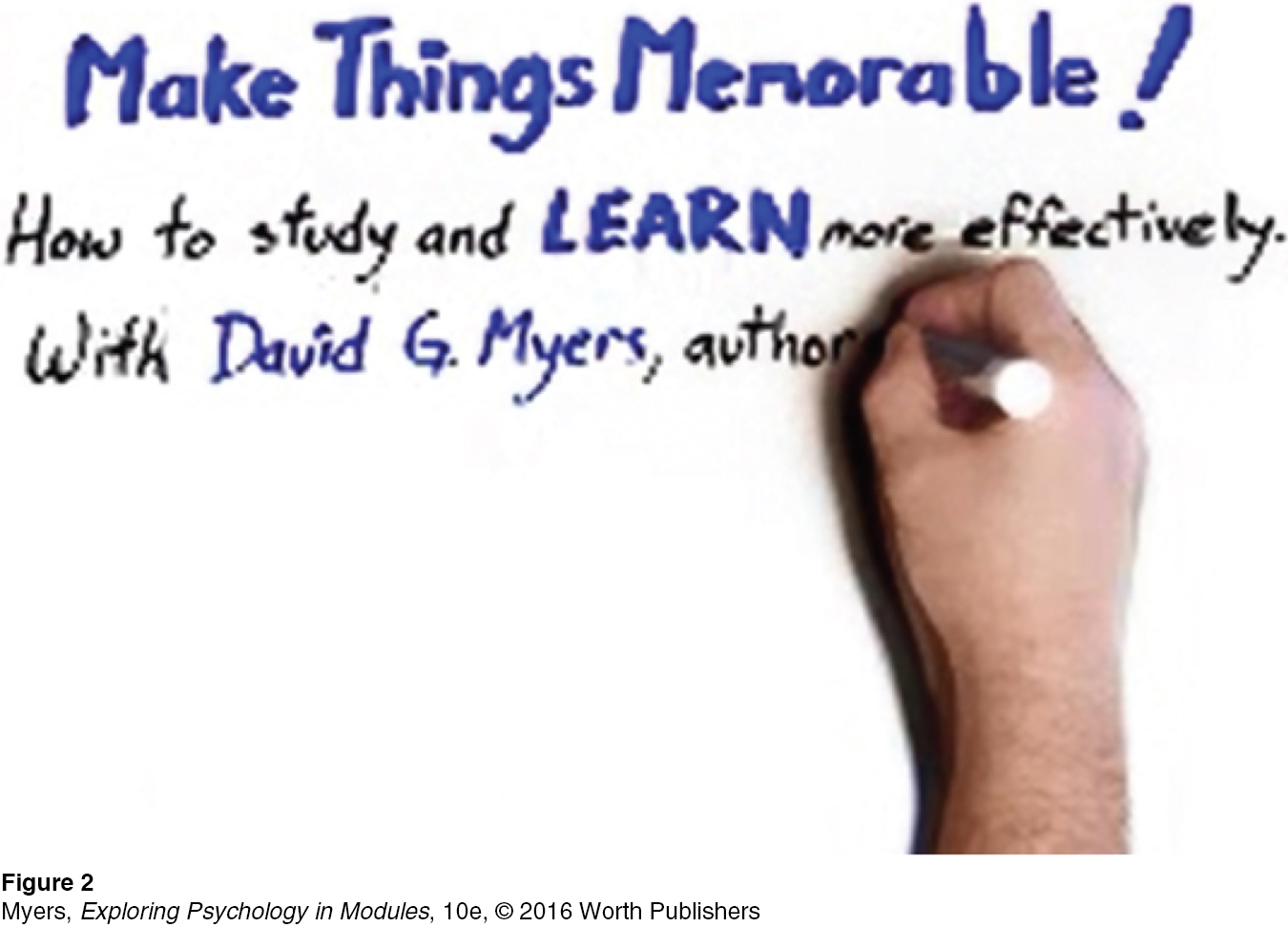
In addition, text sections begin with numbered questions that establish learning objectives and direct student reading. A Review section follows each module, providing students an opportunity to practice rehearsing what they’ve just learned. The Review offers self-
Continually Improving Cultural and Gender Diversity Coverage
Discussion of the relevance of cultural and gender diversity begins on the first page and continues throughout the text.
This edition presents an even more thoroughly cross-
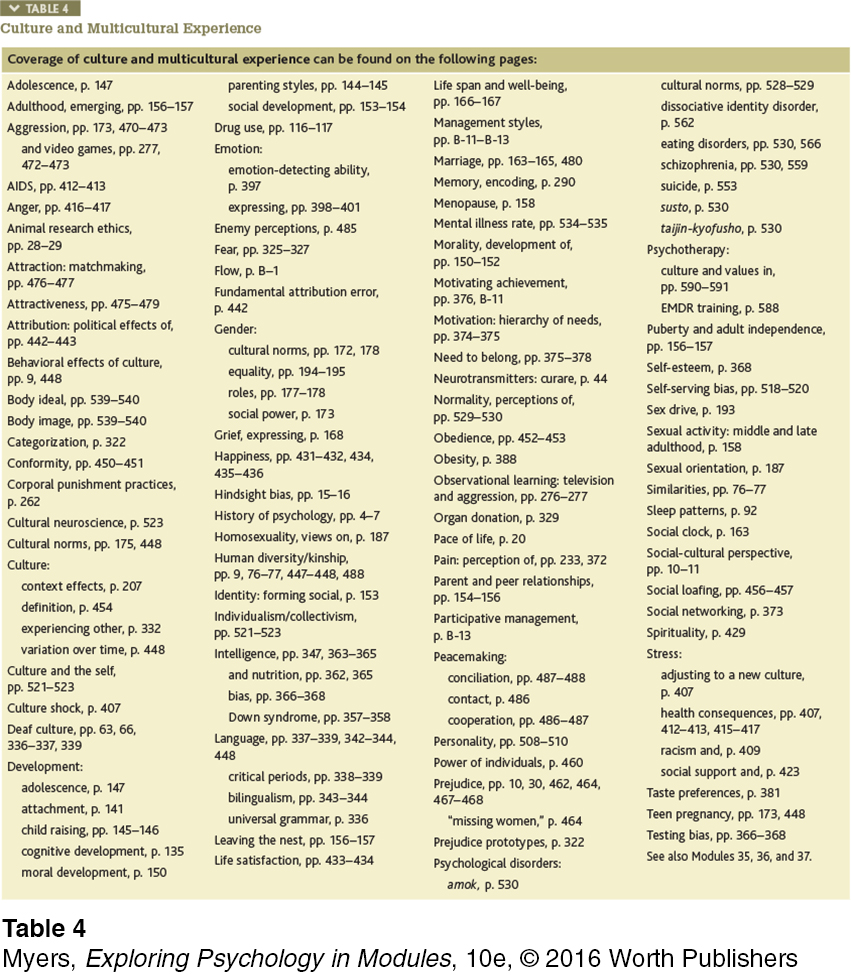
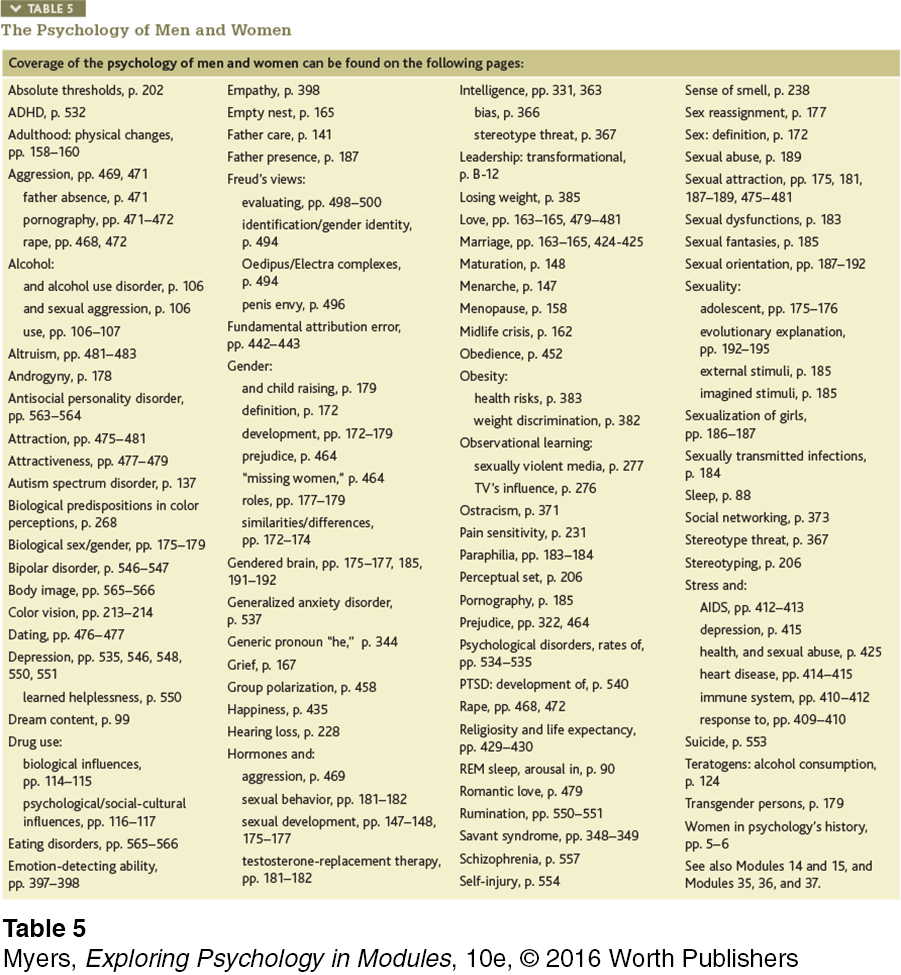
Strong Critical Thinking Coverage
We love to write in a way that gets students thinking and keeps them active as they read, and we aim to introduce students to critical thinking throughout the book. Revised and more plentiful Learning Objective Questions at the beginning of text sections, and even more regular Retrieve It questions encourage critical reading to glean an understanding of important concepts. This tenth edition also includes the following opportunities for students to learn or practice their critical thinking skills.
The Thinking Critically With Psychological Science modules introduce students to psychology’s research methods, emphasizing the fallacies of our everyday intuition and common sense and, thus, the need for psychological science. Critical thinking is introduced as a key term on page 3. Appendix A, Statistical Reasoning in Everyday Life, encourages students to “focus on thinking smarter by applying simple statistical principles to everyday reasoning.”
“Thinking Critically About . . .” boxes are found throughout the book, modeling for students a critical approach to some key issues in psychology. For example, see “Thinking Critically About: Why We Fear the Wrong Things” (Module 25), or “Thinking Critically About: The Stigma of Introversion” (Module 39).
Detective-
style stories throughout the narrative get students thinking critically about psychology’s key research questions. For example, in Module 43, we present the causes of schizophrenia piece by piece, showing students how researchers put the puzzle together.“Apply this” and “Think about it” style discussions keep students active in their study. In Module 35, for example, students take the perspective of participants in a Solomon Asch conformity experiment, and later in one of Stanley Milgram’s obedience experiments. We’ve also asked students to join the fun by taking part in activities they can try along the way. For example, in Module 16, they try out a quick sensory adaptation activity. In Module 32, they try matching expressions to faces and test the effects of different facial expressions on themselves.
See TABLE 6 for a complete list of this text’s coverage of critical thinking topics and Thinking Critically About boxes.
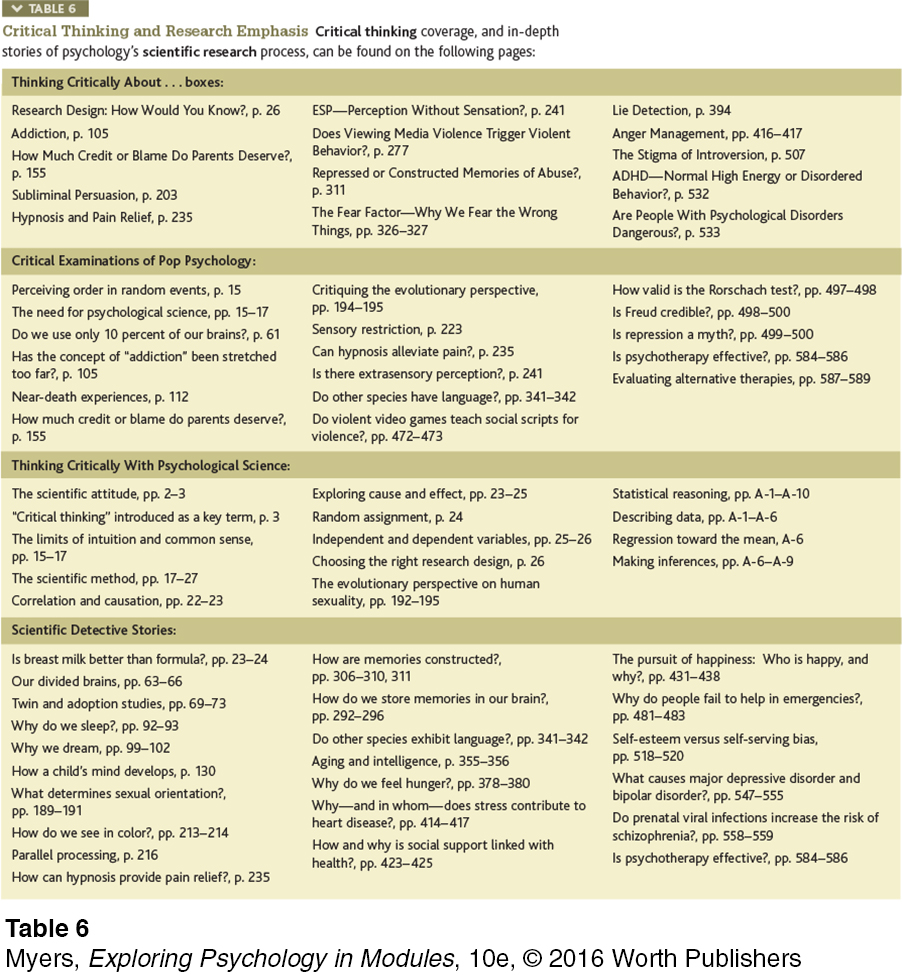
APA Assessment Tools
In 2011, the American Psychological Association (APA) approved the Principles for Quality Undergraduate Education in Psychology. These broad-
APA’s more specific 2013 Learning Goals and Outcomes, from their Guidelines for the Undergraduate Psychology Major, Version 2.0, were designed to gauge progress in students graduating with psychology majors. (See www.APA.org/
Some instructors are eager to know whether a given text for the introductory course helps students get a good start at achieving these APA benchmarks. TABLE 7 (below) outlines the way Exploring Psychology, Tenth Edition in Modules, could help you to address the 2013 APA Learning Goals and Outcomes in your department.
In addition, an APA working group in 2013 drafted guidelines for Strengthening the Common Core of the Introductory Psychology Course (http:/
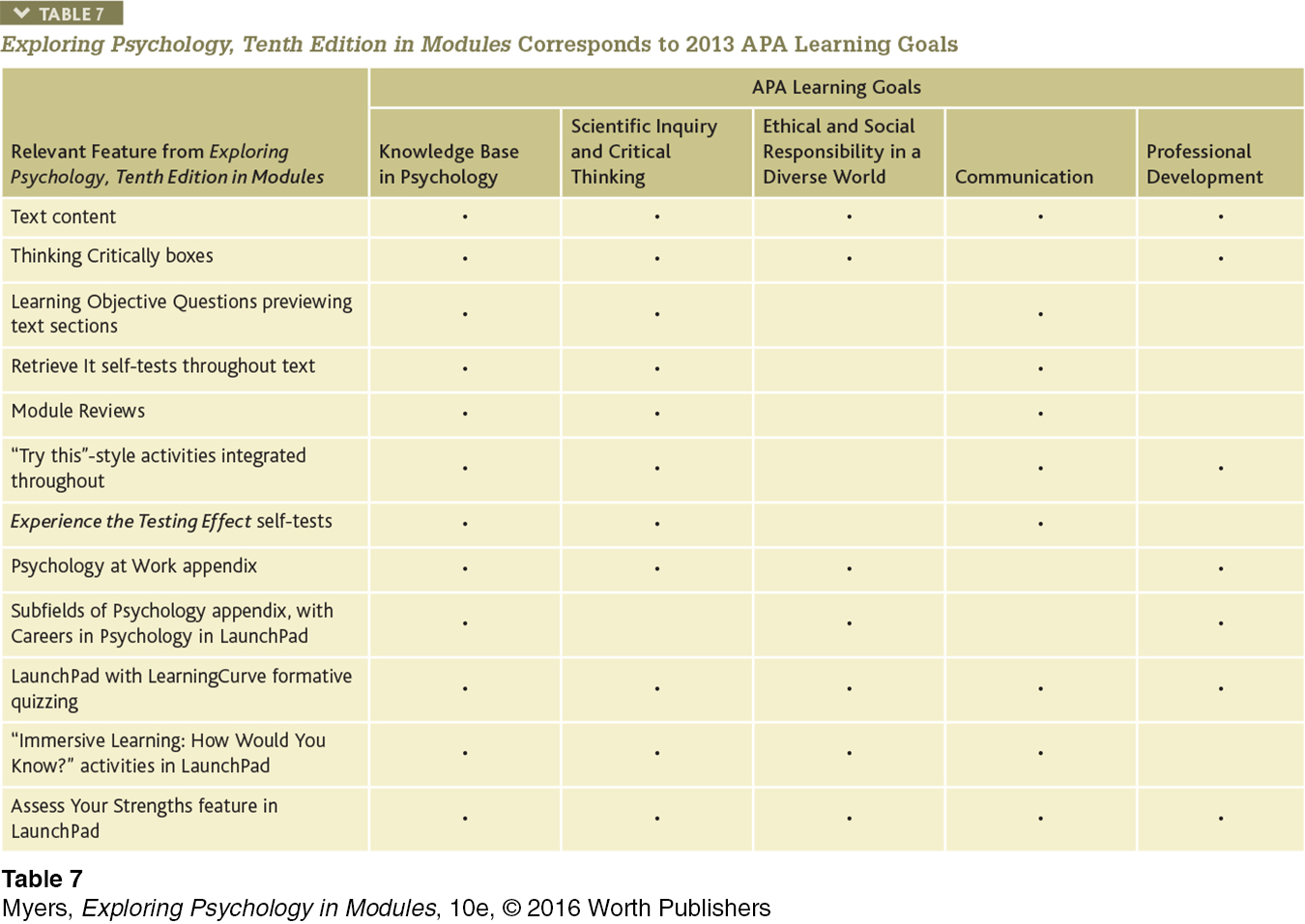
MCAT Now Includes Psychology
Since 2015, the Medical College Admission Test (MCAT) has devoted 25 percent of its questions to the “Psychological, Social, and Biological Foundations of Behavior,” with most of those questions coming from the psychological science taught in introductory psychology courses. From 1977 to 2014, the MCAT focused on biology, chemistry, and physics. Hereafter, reported the Preview Guide for MCAT 2015, the exam will also recognize “the importance of socio-
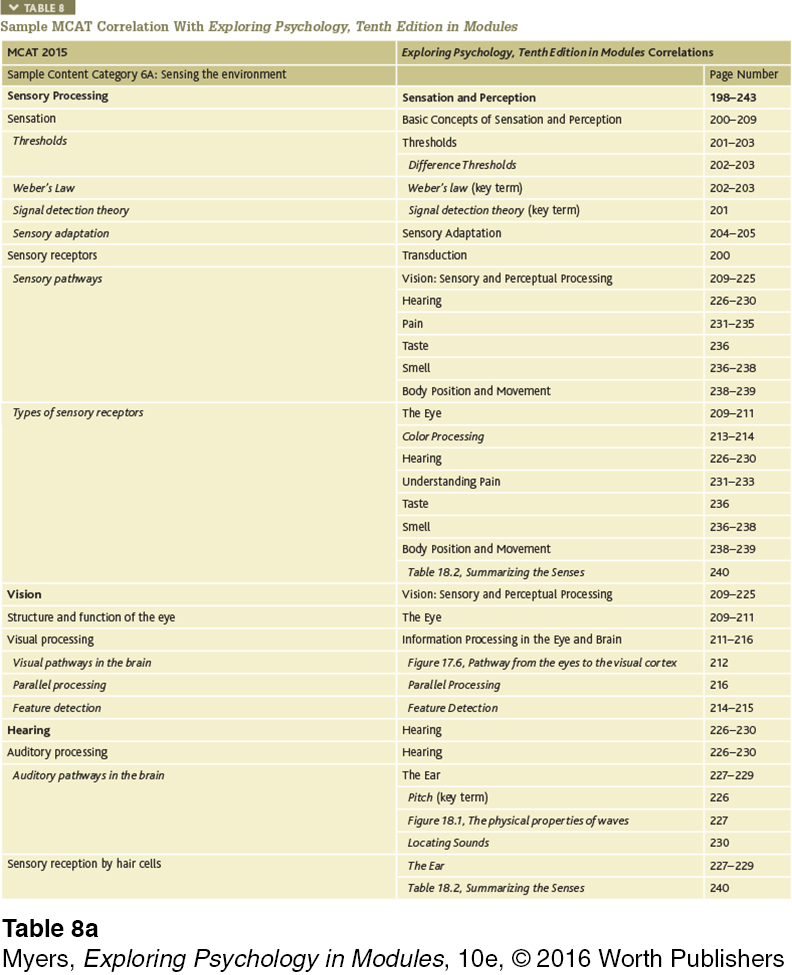
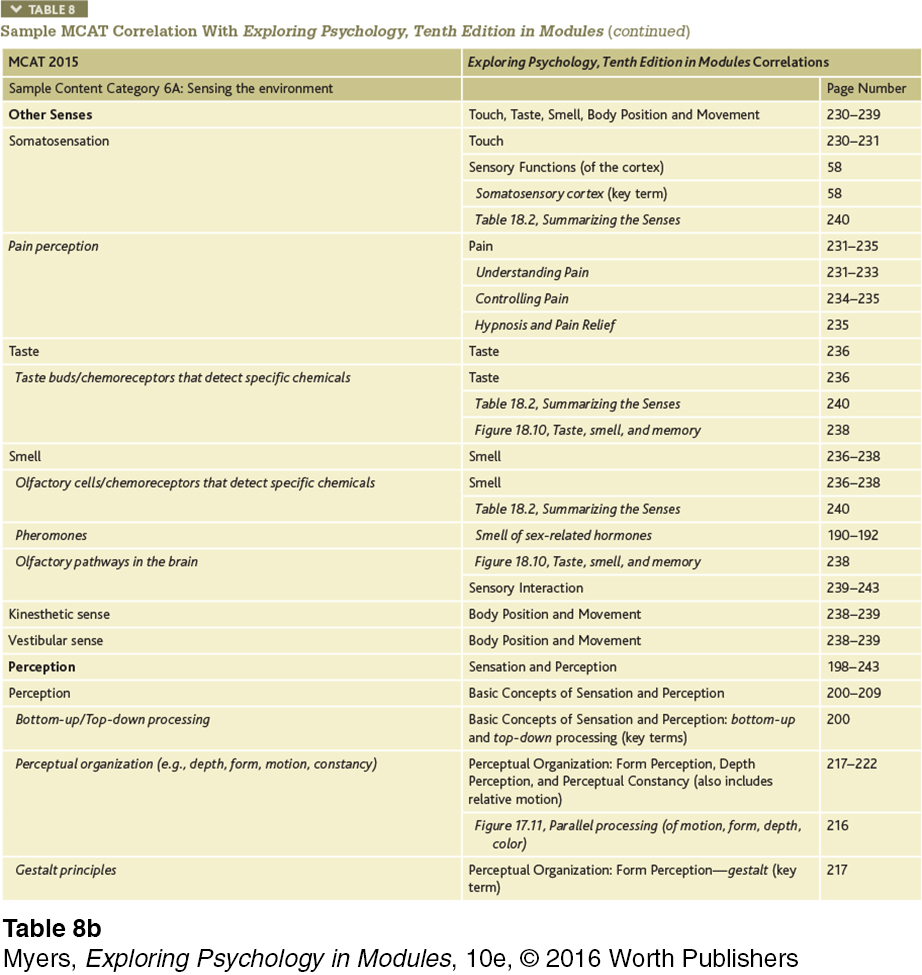
Multimedia for Exploring Psychology, Tenth Edition in Modules
Exploring Psychology, Tenth Edition in Modules, boasts impressive multimedia options. For more information about any of these choices, visit Worth Publishers’ online catalog at http:/
LaunchPad With LearningCurve Quizzing and “Immersive Learning: How Would You Know?” Activities
Built to solve key challenges in the course, LaunchPad (www.MacmillanHigherEd.com/
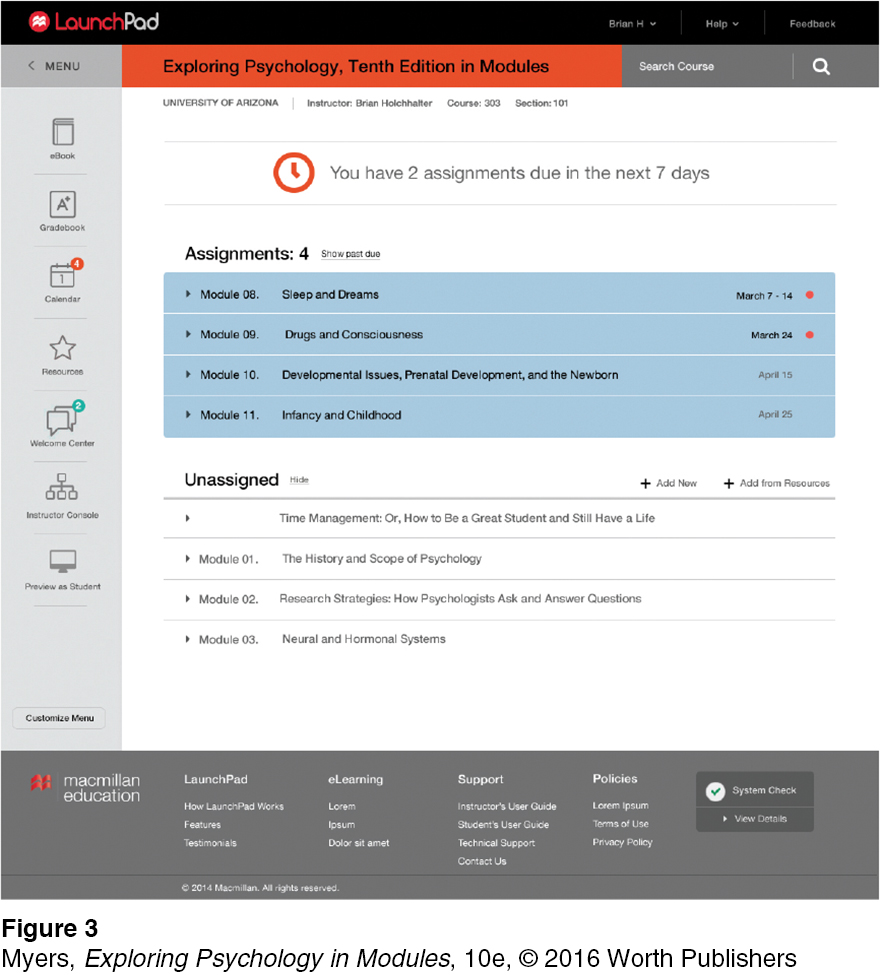
An interactive e-
Book integrates the text and all student media, including the new Immersive Learning: How Would You Know? activities, PsychSim 6 tutorials, and Assess Your Strengths activities.LearningCurve adaptive quizzing gives individualized question sets and feedback based on each student’s correct and incorrect responses. All the questions are tied back to the e-
Book to encourage students to read the book in preparation for class time and exams. PsychSim 6 has arrived! Tom Ludwig’s (Hope College) fabulous new tutorials further strengthen LaunchPad’s abundance of helpful student activity resources.
The new Video Assignment Tool makes it easy to assign and assess video-
based activities and projects, and provides a convenient way for students to submit video coursework. LaunchPad Gradebook gives a clear window on performance for the whole class, for individual students, and for individual assignments.
A streamlined interface helps students manage their schedule of assignments, while social commenting tools let them connect with classmates, and learn from one another. 24/7 help is a click away, accessible from a link in the upper right-
hand corner. We [DM and ND] curated optional pre-
built module units , which can be used as is or customized. Or choose not to use them and build your course from scratch.Book-
specific instructor resources include PowerPoint sets, textbook graphics, lecture and activity suggestions, test banks, and more.LaunchPad offers easy LMS integration into your school’s learning management system.
Faculty Support and Student Resources
Instructor’s Resources available in LaunchPad
Lecture Guides available in LaunchPad
Macmillan Community Created by instructors for instructors, this is an ideal forum for interacting with fellow educators—
including Macmillan authors— in your discipline (FIGURE 4, below). Join ongoing conversations about everything from course prep and presentations to assignments and assessments to teaching with media, keeping pace with— and influencing— new directions in your field. Includes exclusive access to classroom resources, blogs, webinars, professional development opportunities, and more. 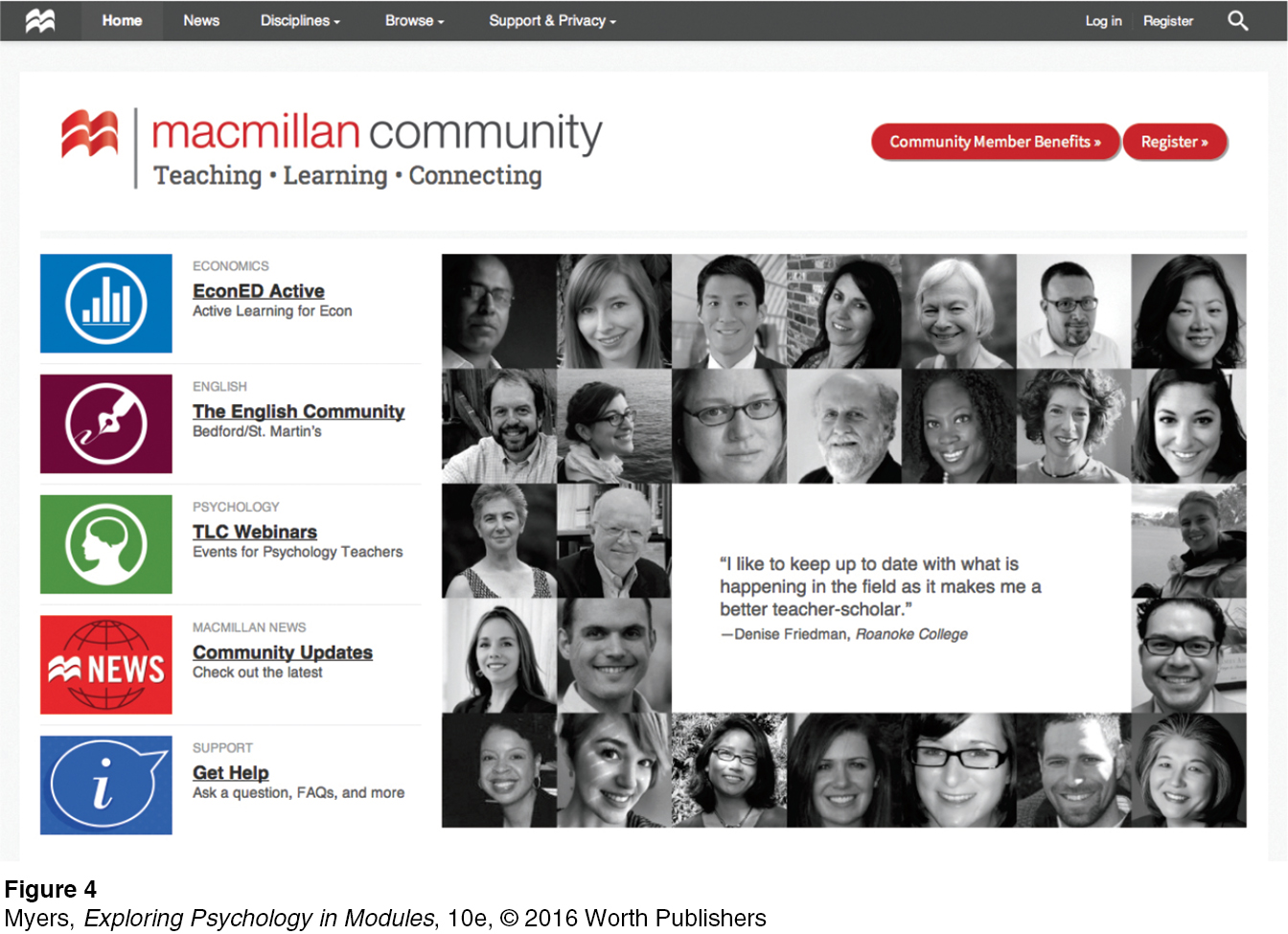 Figure 1.4: FIGURE 4 Sample from Macmillan Community (http:/
Figure 1.4: FIGURE 4 Sample from Macmillan Community (http://Community.Macmillan.com )Enhanced course management solutions (including course cartridges)
e-
Book in various available formats
Video and Presentation
The Video Collection is now the single resource for all videos for introductory psychology from Worth Publishers. Available on flash drive and in LaunchPad, this includes more than 130 clips.
Interactive Presentation Slides for Introductory Psychology is an extraordinary series of PowerPoint® lectures. This is a dynamic, yet easy-
to- use way to engage students during classroom presentations of core psychology topics. This collection provides opportunities for discussion and interaction, and includes an unprecedented number of embedded video clips and animations.
Assessment
LearningCurve quizzing in LaunchPad
Diploma Test Banks, downloadable from LaunchPad and our online catalog
Module Quizzes in LaunchPad
Clicker Question Presentation Slides now in PowerPoint®
Study Guide
Pursuing Human Strengths: A Positive Psychology Guide, Second Edition
Critical Thinking Companion, Third Edition
Psychology and the Real World: Essays Illustrating Fundamental Contributions to Society, Second Edition. This project of the FABBS Foundation brought together a virtual “Who’s Who” of contemporary psychological scientists to describe—
in clear, captivating ways— the research they have passionately pursued and what it means to the “real world.” Each contribution is an original essay written for this project. The Horse That Won’t Go Away Tom Heinzen, Scott Lilienfeld, and Susan Nolan explore the confounding story of Clever Hans and how we continue to be deceived by beliefs with no supporting logic or evidence. This supplemental book shows just how important it is to rely on the scientific method as we navigate our way through everyday life.
In Appreciation
If it is true that “whoever walks with the wise becomes wise” then we are wiser for all the wisdom and advice received from colleagues. Aided by thousands of consultants and reviewers over the last three decades, this has become a better, more effective, more accurate book than two authors alone (these two authors, at least) could write. All of us together are smarter than any one of us.
Our indebtedness continues to each of the teacher-
Our gratitude extends to the colleagues who contributed criticism, corrections, and creative ideas related to the content, pedagogy, and format of this new edition and its teaching package. For their expertise and encouragement, and the gifts of their time to the teaching of psychology, we thank the reviewers and consultants listed here.
Steven Alessandri
Rosemont College
Alison Allen-
Becker College, Worcester Campus
Michael Amlung
University of Missouri
Robin Anderson
St. Ambrose University
Kerri Augusto
Becker College
Renee Babcock
Central Michigan University
Debra Bacon
Bristol Community College
Christi Bamford
Jacksonville University
Darin Baskin
Houston Community College
Kristi Bitz
University of Mary
Kristin Bonnie
Beloit College
Jennifer Breneiser
Valdosta State University
Eurnestine Brown
Winthrop University
Stephen Burgess
Southwestern Oklahoma State University
Verne Cox
University of Texas, Arlington
Gregory Cutler
Bay de Noc Community College
Jennifer Dale
Community College of Aurora
Patrick Devine
Kennesaw State University
David Devonis
Graceland College
Virginia Diehl
Western Illinois University
Joshua Feinberg
Saint Peter’s University
Jessica Fortune
Louisiana Delta Community College
Debra Frame
University of Cincinnati, Blue Ash
Kristel Gallagher
Keystone College
Bilal Ghandour
Queens University of Charlotte
Nicholas Greco
Columbia College of Missouri, Lake County
Michael Green
Lone Star College, Montgomery
Jill Haasch
Elizabeth City State University
Matthew Hand
Texas Wesleyan University
Vivian Hsu
Rutgers University, Livingston
Cameron John
Utah Valley University
Barry Johnson
Davidson County Community College
Jerwen Jou
University of Texas, Pan American
Michelle LaBrie
College of the Canyons
Kay Lesh
Pima Community College
Angelina MacKewn
University of Tennessee, Martin
Crystal March
University of Tennessee, Martin
Kathy McGuire
Western Illinois University
Kathleen Mentink
Chippewa Valley Technical College
Joanna Schnelker Merrill
Kalamazoo College
Nicholas Palmieri
Palm Beach Atlantic University
W. Gerrod Parrott
Georgetown University
Stephanie Payne
Texas A&M University, College Station
Jennifer Perillo
Winston-
Virginia Pitts
Shippensburg University of Pennsylvania
Michael Rader
Johnson County Community College
Chris Roddenberry
Wake Technical Community College
John Roop
Columbus State University
Nancy Ross
Eastern Nazarene College
Conni Rush
Pittsburg State University
Seth Sebold
The City College of New York (CUNY)
Kezia Shirkey
North Park University
Aisha Siddiqui
Midwestern State University
Megan St. Peters
Ferrum College
Elena Stepanova
The University of Southern Mississippi
Michael Stroud
Merrimack College
Helen Sullivan
Rider University
Rachel Sumrall
Grayson College
Lawrence Voight
Washtenaw Community College
Kerri Williams
Lourdes University
Manda Williamson
University of Nebraska, Lincoln
Joseph Wister
Chatham University
Dana Wohl
Thomas College
Jennifer Yanowitz
Utica College
We were pleased to be supported by a 2012/2013 Content Advisory Board, which helped guide the development of this new edition of Exploring Psychology, Tenth Edition in Modules, as well as our other introductory psychology titles. For their helpful input and support, we thank
Barbara Angleberger, Frederick Community College
Chip (Charles) Barker, Olympic College
Mimi Dumville, Raritan Valley Community College
Paula Frioli-
Deborah Garfin, Georgia State University
Karla Gingerich, Colorado State University
Toni Henderson, Langara College
Bernadette Jacobs, Santa Fe Community College
Mary Livingston, Louisiana Tech University
Molly Lynch, Northern Virginia Community College
Shelly Metz, Central New Mexico Community College
Jake Musgrove, Broward College Central Campus
Robin Musselman, Lehigh Carbon Community College
Dana Narter, The University of Arizona
Lee Osterhout, University of Washington
Nicholas Schmitt, Heartland Community College
Christine Shea-
Brenda Shook, National University
Starlette Sinclair, Columbus State University
David Williams, Spartanburg Community College
Melissa (Liz) Wright, Northwest Vista College
We appreciate the guidance offered by the following teaching psychologists, who reviewed and offered helpful feedback on the development of our new “Immersive Learning: How Would You Know?” feature in LaunchPad. (See www.MacmillanHigherEd.com/
Pamela Ansburg, Metropolitan State University of Denver
Makenzie Bayles, Jacksonville State University
Lisamarie Bensman, University of Hawaii at Manoa
Jeffrey Blum, Los Angeles City College
Pamela Costa, Tacoma Community College
Jennifer Dale, Community College of Aurora
Michael Devoley, Lone Star College, Montgomery
Rock Doddridge, Asheville-
Kristen Doran, Delaware County Community College
Nathaniel Douda, Colorado State University
Celeste Favela, El Paso Community College
Nicholas Fernandez, El Paso Community College
Nathalie Franco, Broward College
Sara Garvey, Colorado State University
Nichelle Gause, Clayton State University
Michael Green, Lone Star College, Montgomery
Christine Grela, McHenry County College
Rodney Joseph Grisham, Indian River State College
Toni Henderson, Langara College
Jessica Irons, James Madison University
Darren Iwamoto, Chaminade University of Honolulu
Jerwen Jou, University of Texas, Pan American
Rosalyn King, Northern Virginia Community College, Loudoun Campus
Claudia Lampman, University of Alaska Anchorage
Mary Livingston, Louisiana Tech University
Christine Lofgren, University of California, Irvine
Thomas Ludwig, Hope College
Theresa Luhrs, DePaul University
Megan McIlreavy, Coastal Carolina University
Elizabeth Mosser, Harford Community College
Robin Musselman, Lehigh Carbon Community College
Kelly O’Dell, Community College of Aurora
William Keith Pannell, El Paso Community College
Eirini Papafratzeskakou, Mercer County Community College
Jennifer Poole, Langara College
James Rodgers, Hawkeye Community College
Regina Roof-
Lisa Routh, Pikes Peak Community College
Conni Rush, Pittsburg State University
Randi Smith, Metropolitan State University of Denver
Laura Talcott, Indiana University, South Bend
Cynthia Turk, Washburn University
Parita Vithlani, Harford Community College
David Williams, Spartanburg Community College
And we are grateful for the dozens of instructors in our Macmillan Community (http:/
Creighton University
Lake Superior College
Iowa State University
University of Illinois
University of Minnesota
University of Nebraska Omaha
University of St. Thomas
At Worth Publishers a host of people played key roles in creating this tenth edition.
Although the information gathering is never ending, the formal planning began as the author-
Publisher Rachel Losh has been a valued team leader, thanks to her dedication, creativity, and sensitivity. Rachel has overseen, encouraged, and guided our author-
Tracey Kuehn, Director of Content Management Enhancement, displayed tireless tenacity, commitment, and impressive organization in leading Worth’s gifted artistic production team and coordinating editorial input throughout the production process. Project Editor Robert Errera and Senior Production Manager Sarah Segal masterfully kept the book to its tight schedule, and Director of Design, Content Management Enhancement Diana Blume skillfully directed creation of the beautiful new design and art program. Production Manager Stacey Alexander, along with Supplements Project Editor Julio Espin, did their usual excellent work of producing the print supplements.
Christine Brune, chief editor for all 10 editions, is a wonder worker. She offers just the right mix of encouragement, gentle admonition, attention to detail, and passion for excellence. An author could not ask for more. Development Editor Nancy Fleming is one of those rare editors who is gifted both at “thinking big” about a module—
To achieve our goal of supporting the teaching of psychology, this teaching package not only must be authored, reviewed, edited, and produced, but also made available to teachers of psychology. For their exceptional success in doing that, our author team is grateful to Worth Publishers’ professional sales and marketing team. We are especially grateful to Executive Marketing Manager Kate Nurre and Senior Marketing Manager Lindsay Johnson, both for their tireless efforts to inform our teaching colleagues of our efforts to assist their teaching, and for the joy of working with them.
At Hope College, the supporting team members for this edition included Kathryn Brownson, who researched countless bits of information and proofed hundreds of pages. Kathryn is a knowledgeable and sensitive adviser on many matters, and Sara Neevel is our high-
Again, I [DM] gratefully acknowledge the editing assistance and mentoring of my writing coach, poet Jack Ridl, whose influence resides in the voice you will be hearing in the pages that follow. He, more than anyone, cultivated my delight in dancing with the language, and taught me to approach writing as a craft that shades into art. Likewise, I [ND] am grateful to my intellectual hero and mentor, Roy Baumeister, who taught me how to hone my writing and embrace the writing life.
After hearing countless dozens of people say that this book’s resource package has taken their teaching to a new level, we reflect on how fortunate we are to be a part of a team in which everyone has produced on-
Finally, our gratitude extends to the many students and instructors who have written to offer suggestions, or just an encouraging word. It is for them, and those about to begin their study of psychology, that we have done our best to introduce the field we love.
* * *
The day this book went to press was the day we started gathering information and ideas for the next edition. Your input will influence how this book continues to evolve. So, please, do share your thoughts.

Hope College Holland, Michigan 49422-

University of Kentucky Lexington, Kentucky 40506-
Content Changes
Exploring Psychology, Tenth Edition in Modules includes hundreds of new research citations, new “Immersive Learning: How Would You Know?” research activities in LaunchPad, exciting new “visual scaffolding” two-
Thinking Critically With Psychological Science
The History and Scope of Psychology
The Scientific Attitude and Critical Thinking now appear in this module (moved here from the ninth edition’s Module 2), establishing these foundational principles at the discussion’s outset.
Improved organization and expanded coverage of psychology’s historical and contemporary development.
New discussion of cross-
cultural and gender psychology, with new illustrations. New introduction of positive psychology.
New photos provide examples of famous psychology majors.
Evolutionary psychology and behavior genetics are now key terms.
New material on community psychology, which is now a key term.
New illustration introduces the biopsychosocial approach more effectively.
Updated table of current perspectives.
Research Strategies: How Psychologists Ask and Answer Questions
Updated discussion of critical thinking in public policy.
New research support for hindsight bias in people of all ages from across the world.
Importance of research replication given increased emphasis.
New research with figure on Twitter message moods, and on the relationship between negative emotions on Twitter and heart disease rates in more than a thousand U.S. counties, illustrates discussion of “big data” methods in naturalistic observation.
Updated research examples reinforce correlational studies’ not being cause-
effect. New research updates breast-
feeding versus bottle- feeding example. New research examples update discussion of the placebo effect, and indicate that the effect persists even upon learning that one has received a placebo.
New Thinking Critically About Research Design: How Would You Know? feature explores research design in psychological science and introduces the new “Immersive Learning: How Would You Know?” LaunchPad activities.
The Biology of Behavior
New co-
author Nathan DeWall led the revision of these modules for the tenth edition.
Neural and Hormonal Systems
New research explores our inaccurate tendency to consider biological and psychological influences on behavior separately.
Research updates discussion of neural network pruning throughout life.
New photo illustrates complex network of human cortical neurons.
Expanded discussion of how neurons generate electricity from chemical events, with new figure.
Improved figure more effectively demonstrates action potential.
New discussion, with refractory period as new key term.
All-
or- and reuptake are now key terms.none response New coverage of agonists and antagonists, which are now key terms.
Sensory neurons are now identified as afferent (inward), and motor neurons as efferent (outward).
Expanded illustration of the functional divisions of the nervous system.
Updated research on the effect of oxytocin on social trust.
Tools of Discovery and Older Brain Structures
The Tools of Discovery boxed essay has been expanded, updated, and transformed into text discussion.
New photo shows living human brain.
New research on use of neuroimaging in the media and advertising.
Updated information on massive Human Connectome Project.
Hippocampus now a key term here as well as in Module 23, with new research example.
New research examples demonstrate the amygdala’s role in fear and rage.
Updated discussion of the hypothalamus with new research on hedonic hotspots, desire, and substance use disorders.
The Cerebral Cortex and Our Divided Brain
New research example of robotic limbs controlled by a device implanted in the motor cortex.
Coverage of the somatosensory cortex (previously referred to as the “sensory cortex”) has been fully updated.
New research notes the effects of simple versus complex tasks on brain activity.
New research updates discussion of Phineas Gage, with new art.
New photo example of brain injury, crime, and punishment.
New diffusion spectrum image shows neural networks connecting hemispheres.
Includes new research on brain plasticity in those who cannot hear.
Genetics, Evolutionary Psychology, and Behavior
New photo explains the nature–
nurture interaction. Heredity and genome are new key terms.
Updated discussion of twin and adoption studies, includes autism spectrum disorder diagnoses, and personality and behavioral similarities.
New photo examples of identical twins and unrelated lookalikes.
New photo examples of celebrities who were adopted.
Gene-
Environment Interaction includes new research on identical twins creating shared experiences. New photo example of space study with astronauts Scott and Mark Kelly.
Distinction between genetics and epigenetics clarified.
Additional examples demonstrate effects of environmental factors on epigenetic molecules.
New research examples illustrate the mismatch of our prehistoric genetic legacy with modern life.
Updated discussion of evolution and faith.
Consciousness and the Two-
Consciousness: Some Basic Concepts
Expanded coverage of conscious awareness, with new research examples.
New art illustrates inattentional blindness.
New research example illustrates the effects of driver distraction on traffic accidents.
Includes new Eric Kandel estimate that 80 to 90 percent of what we do is unconscious.
Parallel processing is now a key term in this module, as well as in Module 17.
Sleep and Dreams
New research updates discussion of night “owls” and morning “larks.”
New research examples illustrate sleep pattern variations.
Suprachiasmatic nucleus figure is improved.
Updated research on sleep’s functions and benefits, sleep deprivation, and the function of dreams.
Updated table on natural sleep aids.
New photo illustrates CPAP machine for sleep apnea.
New research example explores “The Great Sleep Recession.”
New research suggests sleep-
deprived brains find fatty foods more enticing. Updated research on sleep-
deprived students experiencing more relationship conflicts. What We Dream section updated with new research, including cases of those unable to see or walk from birth having these abilities in their dreams.
Lightly updated table compares dream theories.
New figure illustrates sleep’s consolidation of learning into long-
term memory. New research suggests we can learn to associate sounds with odors while asleep.
New figure and photo illustrate sleep patterns across the life span.
Drugs and Consciousness
Coverage of hypnosis now appears in a Thinking Critically box on pain control in Module 18, The Nonvisual Senses.
Cocaine is now a key term.
New table outlines When Is Drug Use a Disorder?
New research on alcohol “intervention studies” that have lowered college students’ positive expectations and also reduced consumption.
Powerful new photo shows firefighters reenacting an alcohol-
related car accident. Expanded explanation of the opiates and their effects.
Updates on lethal effects of smoking, including life expectancy 10+ years shorter.
New research on smokers’ relapse under stress.
New coverage of synthetic marijuana, or “spice,” and its effects.
New research suggests drop in IQ scores among persistent teen marijuana users.
Discussion of biological influences on drug use updated with new research.
Table showing selected psychoactive drugs has been expanded and updated.
New photo shows media models of smoking that influence teens.
Updated graph of high school trends in drug use.
Developing Through the Life Span
New co-
author Nathan DeWall led the revision of these modules for the tenth edition.
Developmental Issues, Prenatal Development, and the Newborn
New research expands Stability and Change discussion.
Conception discussion expanded and clarified.
New research demonstrates newborns’ preference for hearing their mother’s language.
New research shows effects of smoking and extreme stress during pregnancy.
Infancy and Childhood
New research explores relationship between rapid increase in infant brain size and early development.
New research in Brain Development shows that premature babies given skin-
to- skin contact are better off even 10 years later. New research notes that mice and monkeys, like human children, forget their early life.
New photo shows egocentrism in action.
New same-
sex marriage example illustrates accommodation. New research demonstrates the ways preschoolers think like scientists.
New real-
life example illustrates the curse of knowledge. New research suggests social benefits for children with advanced ability to take another’s perspective.
New research suggests benefits of positive self-
talk are not limited to children. “Autism Spectrum Disorder and Mind-
Blindness” boxed essay has been updated and improved and has become its own text section, “Autism Spectrum Disorder.” New photo of twins with ASD.
Expanded perspective on the Harry Harlow experiments includes quotes from Harlow and his biographer.
New research demonstrates relationship between heredity, temperament, and attachment style.
Attachment Styles and Later Relationships updated with new research examples demonstrating the later effects of secure and insecure attachments.
New table outlines dual-
parenting facts. New research illuminates the effects of deprivation of attachment and growing up under adversity.
New research shows effects of abuse and conflict on children’s brains, and epigenetic marks left by child abuse.
New research discussion of Western parents’ assertions that their children are more special than other children.
New Gallup survey illustrates joy and stress of raising children.
Adolescence
New research and new figure explores adolescent decision making and risk taking, and effects of frontal lobe immaturity in juvenile offenders and drug users.
Developing Morality section updated with new research demonstrating development of moral judgment, benefits of moral action, effects of delayed gratification on human flourishing, and connections to the two-
track mind. New photo illustrates moral reasoning during Superstorm Sandy.
Includes new research on American teens’ contentment with their lives and the importance of emotional intimacy to adolescent identity formation.
New research illustrates increased brain activation in adolescents when in one another’s company, and the effects of this activation.
- Page xl
Updated research notes the different types of teen-
parent bickering that typically occur with adolescent boys versus adolescent girls. Thinking Critically About: How Much Credit or Blame Do Parents Deserve? feature updated with new research on cultural differences in parenting.
New research notes teens’ tendency to discount the future and focus on immediate rewards when in the presence of their peers.
New research notes prevalence of online social networking and its effects on peer relationships.
Emerging Adulthood discussion includes updated figure on the lengthening transition to adulthood.
Adulthood
New research on baseball players demonstrating that humans peak physically in their mid-
twenties. New research explains effects of aging on the brain, and the brain’s plasticity.
New research supports benefits of exercising on aging.
New research on “reminiscence bump,” and older adults’ greater tendency for tip-
of- the- tongue memories. New section on Sustaining Mental Abilities includes concept of “brain fitness.”
New research indicates human tendency to prefer social connection over learning when facing death.
Personal examples from authors demonstrate importance of chance events in our development.
New research shows lowering divorce rates.
Adulthood’s Commitments section expanded and updated.
New figure illustrates increased online meeting of relationship partners.
New photo illustrates connection between job satisfaction and life satisfaction.
New figure shows importance of social connecting throughout life.
New research explores older adults’ experience of complex emotions, tendency to attend more to positive information, and reduced number and increased stability of friendships.
New research with grieving parents explores factors that may prolong the grieving process.
Sex, Gender, and Sexuality
Title changed from “Gender and Sexuality” in previous edition, reflecting new discussion of the distinction between gender and biological sex.
Updated introduction includes new research on women’s and men’s evolving gender roles and women in business, as well as new personal stories from the authors.
Gender Development
Sex, now a key term, is included in an updated, expanded discussion of differentiating sex and gender.
New photo example illustrates tragic effects of relational aggression, which is now a key term.
Thoroughly updated discussion of male-
female differences in aggression, social power, and social connectedness, with new research examples throughout. Expanded and updated discussion of biological sex, including differences in sexual development, with new research examples throughout.
Spermarche is now a key term.
Disorder of sexual development is now a key term.
The Nurture of Gender section revised and updated with new research throughout, including preferential hiring of female professors to teach STEM classes.
New coverage of gender cognition in transgender children.
How Do We Learn Gender? section updated with new photos of Caitlyn Jenner’s transition.
Androgyny is now a key term.
Human Sexuality
New research indicates that people’s brains crave their partner’s presence.
New research updates discussion of effects of women’s hormonal surges at ovulation.
New research considers whether women’s mate preferences change across the menstrual cycle.
Statistics updated on the worldwide prevalence of sexually transmitted infections.
New data on the proportion of women with HIV and number of worldwide HIV deaths.
New research explores relationship of fantasy to orgasms in women.
Teen Pregnancy updated with new research.
New photo illustrates the hypersexualization of female characters in video games.
New research indicates the cross-
cultural differences in attitudes toward same- sex unions. New research updates the numbers of people who identify with particular sexual orientations, and explores accuracy of self-
identification. New research explores effects of a lack of social support on nonheterosexual teens.
Updated research on the relative fluidity of women’s sexual orientation.
Discussion of genetic influences on sexuality updated with new research examples.
- Page xli
New hands-
on activity asks students to predict research answers to questions about male- female sexuality differences. Male-
Female Differences in Sexuality updated with new research on sex drives and sexual habits of heterosexual and homosexual men and women. Reworked and updated Natural Selection and Mating Preferences section includes new research on what men and women seek in potential mates.
New research examples question evolutionary psychology’s explanation of mating preferences.
Critiquing the Evolutionary Perspective includes new counter-
argument noting the smaller behavioral differences between men and women in cultures with greater gender equality, and the influence of social scripts. New Sex and Human Values section includes new research on benefits of sex in committed relationships and the interplay between sexual desire and love.
Sensation and Perception
Basic Concepts of Sensation and Perception
New neuroscience research on the ability of priming to evoke brain activity without conscious awareness.
New coverage of the adaptation of emotion perception, with photo example for students to try.
New figure illustrates perceptual set.
New photo asks students to identify an emotion removed from its context.
New research example notes the effect of holding a firearm on one’s perceptions of others as gun-
toting, and the tragic consequences of this phenomenon. Updated research on music’s effect on perception.
New research on how emotions and motives color our social and environmental perceptions.
Vision: Sensory and Perceptual Processing
New research details the effects of light intensity—
including even imagined light intensity— and our cognitive and emotional states on the pupil and iris. Color Processing section shifted up to follow discussion of Retinal Processing.
Updated art more effectively demonstrates the figure-
ground relationship. New research example explores the role of learning in infants’ depth perception.
New research supports performing cataract surgery in children at as young an age as possible.
The Nonvisual Senses
New coverage of the speed of audition.
Updated coverage of hearing loss, including global statistics and cochlear implants, with new art.
Includes new research on the influence of cognition on response to touch, including the effect of familiar touch on experience of pain.
New research shows women’s greater sensitivity to pain.
New photo example illustrates powerful effect of distraction on experience of pain.
New research shows women’s tendency to recall pain of childbirth in terms of average of peak and end pain.
New research shows how the ending of an experience affects perception of pain and also pleasure.
New research supports maximizing pain relief with placebos, distraction, and hypnosis.
Hypnosis moved here from ninth edition Module 7; now covered in a new Thinking Critically About: Hypnosis and Pain Relief box.
Includes new research example of learning to like what we eat.
New research notes that each taste receptor has a matching partner cell in the brain.
New cognitive neuroscience research helps explain smell-
cognition connection. New research illustrates blending of tactile and social judgments.
New photo example demonstrates value of sensory interaction for hard-
of- hearing people. Updated Summarizing the Senses table includes new column noting the key brain areas in which events take place.
ESP discussion includes new research on psychic predictions about missing-
person cases, and on multiple unsuccessful attempts to replicate experiments demonstrating psychic abilities.
Learning
Compelling new introduction.
Basic Learning Concepts and Classical Conditioning
New figure illustrates Pavlov’s device for recording salivation.
New research shows how we tend to fall back on old habits when our willpower is low.
Research update supports finding that we generalize our like or dislike based on learned facial features.
New information on what happened to “Little Albert.”
Operant Conditioning
New research supports idea that children’s compliance increases after “time out” punishment.
Discussion of physical punishment and increased aggressiveness updated with new research, as well as global figures on legal protections for children.
New research supports idea that punishment should focus on prohibitions rather than positive obligations.
Updated research on how adaptive learning software supports individualized learning.
Updated summary of how best to reinforce desired behaviors.
Biology, Cognition, and Learning
New photo illustrates research on the association of the color red with sexual attractiveness.
New research suggests that a focus on intrinsic rewards in schooling and career may lead to extrinsic rewards as well.
New research supports children’s and infants’ natural propensity for imitation.
New research supports vicarious reinforcement, with even learned fears being extinguished when we observe others safely navigating the feared situation.
New discussion of current debate regarding importance of mirror neurons.
Updated research on the prevalence of imitation in other species.
Expanded coverage, with new photos, of social learning among other animals.
Includes new research on the effects of a vicarious prompt on empathy and imitation.
New research notes how prosocial media boosts helping behaviors.
Thinking Critically About: Does Viewing Media Violence Trigger Violent Behavior? feature updated with new research examples.
Memory
Studying and Encoding Memories
Includes new music and face recognition research examples, and new photo of face recognition in sheep research.
New research shows those with large working memory capacity retain more after sleep and tend to be creative problem solvers.
New research details the spacing effect’s influence on motor skills and online game performance, and the benefits of distributed practice.
New research supports testing effect and notes ineffectiveness of other common study habits.
Storing and Retrieving Memories
New research shows memory components’ distribution across a network, with some of those brain cells activating again upon memory retrieval.
Episodic memory and semantic memory are now key terms.
New research notes activity of the hippocampus and nearby brain networks as people form explicit memories, with new image of the hippocampus.
Memory consolidation is now a key term.
Updated discussion of infantile amnesia includes new research on increased retention in the maturing hippocampus.
New research on flashbulb memory and tunnel vision memory.
Research update on how experience and learning increase synaptic number as well as efficiency.
Hippocampus is now a key term.
New personal story from author illustrates effect of having insufficient time for memory consolidation.
Discussion of synaptic changes in memory processing includes new research on memory-
blocking drugs. Updated research explores how priming can influence behaviors.
New examples illustrate context-
dependent memory.
Forgetting, Memory Construction, and Improving Memory
New research updates discussion of those with superior autobiographical memories.
Discussion of Henry Molaison updated with new research on the effects of his hippocampus removal, and his nondeclarative memory abilities.
Includes new research on wide belief in repression of traumatic memories.
Reconsolidation is now a key term.
Memory construction now demonstrated with author’s personal experience at Loftus presentation.
New research updates discussion of memory reconsolidation of negative or traumatic events.
Updated research on false memories examines mistakenly convicted people who were victims of faulty eyewitness identification.
New photo illustrates research on false memories.
Discussion of memories of abuse includes new research and has become a Thinking Critically About feature.
New research offers more tips for effective study habits.
New research updates discussion of encoding failure.
Thinking, Language, and Intelligence
Thinking
New narrative and photo examples of prototype.
New figure demonstrates how categorizing faces influences recollection.
New research shows how insight improves when electrical stimulation disrupts assumptions created by past experiences.
Updated research supports effectiveness of intuitive judgments.
Discussion of availability heuristic enhanced with climate change example.
Includes new research about cigarette package warnings.
Updated discussion of why we fear the wrong things, with new research examples throughout.
New research example demonstrates how overconfidence can feed extreme political views.
New research explains the planning fallacy.
Includes new research on value and perils of using intuition for complex decisions; new examples relate to attitudes and decision making.
Research updates discussion of unconsciously learned associations.
Includes new research on importance of intelligence and working memory for aptitude.
Includes new research and photo example on the development of creative traits in girls.
New research expands discussion of fostering creativity.
Discussion of animals’ cognitive skills updated with new research.
Language and Thought
Updated research shows humans, regardless of language, prefer some syllables over others.
New research updates discussion of babies’ language comprehension and productive language development.
New research supports diversity of human language.
Discussion of the brain and language updated with new research on distributed processing of language in the brain.
Includes new research on animal cognition, as well as neuroscience research on a gene unique to humans that helps enable speech.
Improved figure illustrates brain activity when speaking and hearing words.
New research updates discussion of language’s ability to influence our thinking, emotions, and cultural associations.
Additional research example demonstrates language’s impact on perceived differences.
Includes new research on the advantages of bilingualism.
Intelligence and Its Assessment
Discussion of the g factor includes new research exploring how distinct brain networks enable distinct abilities.
Now includes Gardner’s ninth possible intelligence, existential intelligence.
Includes new photo example of savant syndrome.
New photo demonstrates spatial intelligence genius.
New research with professional musicians demonstrates importance of both natural talent and self-
disciplined grit in achieving success. Updated table comparing theories of intelligence includes new category, emotional intelligence.
Expanded discussion of history of intelligence tests includes more on Alfred Binet’s research and Lewis Terman’s support of the eugenics movement.
Discussion of intelligence’s stability over the life span includes new data from the Scottish intelligence survey of 1932, with new figure.
Updated discussion of intelligence extremes includes new research on adult achievements of those who scored high on SAT in their youth.
Genetic and Environmental Influences on Intelligence
New research updates and clarifies discussion of the heritability of intelligence.
New research supports quality preschool programs and experiences, nutritional supplements for newborns and mothers, and interactive reading programs.
New research notes the increased variability of males’ intelligence.
New photo example of Shakuntala Devi, “the human computer.”
New cross-
cultural research supports impact of cultural and other expectations on academic flourishing. New research updates discussion of intelligence variation due to racial, ethnic, and socioeconomic differences.
New research discusses influence of stereotype threat on gender gap in high-
level math achievements. Includes updated discussion of stereotype threat, importance of a growth mind-
set and self- discipline, belief in the power of effort, and intellectual curiosity for real- world achievements. New research notes the limitations of general intelligence tests in reflecting competence.
Motivation and Emotion
Powerful new introduction.
Basic Motivational Concepts, Affiliation, and Achievement
New research on risk-
taking behavior, and on uncertainty amplifying motivation. New research examples illustrate the search for arousal in the absence of stimulation and the effects of overstimulation.
New research suggests decreasing arousal can decrease stress.
Hunger Games example now illustrates Maslow’s hierarchy.
New table compares Classic Motivation Theories.
Affiliation need is now a key term.
Includes new research on attachment bonds, whom we befriend, and the benefits of close friendship.
Updated research on the relationship between marriage and life satisfaction.
New research example notes increased doctor visits in lonely older adults.
Includes new research on need to belong driving formation of social connections, and benefits of these connections.
The Pain of Being Shut Out updated with new research, with ostracism a new key term.
Connecting and Social Networking section fully updated, with narcissism now a key term.
New research in Achievement Motivation demonstrates importance of grit, now a key term.
Hunger
New Unbroken photo example illustrates how hunger can drive an obsession with food.
New research illustrates power of motivational “hot” states from hunger, fatigue, or sexual arousal.
New research on the body’s weight regulation.
New research updates discussion of biological and cultural influences on taste preferences and situational influences on eating.
New research offers ways to encourage healthier eating in children.
Obesity and Weight Control updated with cross-
cultural comparisons and global statistics; new research on physiology of obesity; negative social, health, and memory effects of obesity; and genetic basis for weight. Waist Management boxed essay is now a table of evidence-
based tips for weight loss.
Theories and Physiology of Emotion
New research shows subjectivity of emotional experience.
New research illustrates brain activity underlying emotions and emotion-
fed actions. Includes new research on reappraisal and its effects.
Expressing and Experiencing Emotion
New research updates discussion of gender differences in emotional experience.
New research on humans’ ability to detect nonverbal threats and status signs.
New research updates discussion of effects of facial expressions, including findings on Botox, depression, and the facial feedback effect.
Behavior feedback effect now a key term.
Stress, Health, and Human Flourishing
New co-
author Nathan DeWall led the revision of these modules for the tenth edition. Compelling new introduction.
Stress and Illness
New figure demonstrates how researchers study stress.
New research shows effects of stress on workers and pregnant women.
Includes new research on stress effects of traumatic events.
Now introduces concept of acculturative stress.
New research shows younger adults reporting higher daily stress.
New research updates discussion of daily hassles and social stress.
Includes new research on lasting effects of childhood stress.
New research shows effects of stress on vaccine effectiveness.
Discussion of stress and AIDS updated with new research and current data.
Updated research on the stress-
cancer link. New research and data updates discussion of stress and heart disease.
The ninth edition boxed essay on Handling Anger has been revised and updated to become Thinking Critically About: Anger Management.
Includes new discussion of the Type D personality.
New research updates the discussion of the health effects of pessimism and depression.
Health and Happiness
Coping With Stress updated with new research.
Includes expanded explanation of learned helplessness.
New research updates Depleting and Strengthening Self-
Control. Includes new research on the traits of optimists and pessimists, and the potential for learning optimism.
New research demonstrates importance of social support to psychological and physical well-
being, with information on cultural differences in seeking support. New research illustrates effect of aerobic exercise on longevity, depression, and relationships, and the recent decline of Americans’ physical activity.
Relaxation and Meditation section revised and updated, including research showing link between meditation and decreased depression and anxiety, and improved decision making.
Mindfulness meditation is now a key term.
New research suggests happiest 20-
year- olds were later more likely to marry and less likely to divorce. New research illustrates do-
good, feel- good phenomenon. New research suggests mood rebounds after bad events, and happiness levels can return to near-
normal after significant trauma. New research updates list of tips for being happier.
New research explores connection between wealth and well-
being, including well- being effects of income inequality.
Social Psychology
Social Psychology modules now precede Personality modules.
Social Thinking and Social Influence
New research updates discussion of the effect of attribution on our judgment of others.
New photo example of Charleston Bible study murders demonstrates dispositional versus situational attributions.
Discussion of effect of attitudes on actions updated with climate-
change debate example. Role Playing updated with new research on reliability of Zimbardo study and effects of military training.
New research illuminates brain activity associated with cognitive dissonance.
Discussion of automatic mimicry updated with new research.
Milgram discussion includes updated coverage of replications of his research with different groups, and new discoveries about his data.
New research example considers how the circumstances of the Rwandan genocide promoted obedience.
Includes updates on the Internet as social amplifier, demonstrating group polarization online.
New table compares social facilitation, social loafing, and deindividuation.
Antisocial Relations
New research demonstrates accuracies and inaccuracies of stereotypes.
Updated research on sexual orientation prejudice.
New research explores unfounded prejudice toward Muslims, with new photo example.
New photo example of Trayvon Martin illustrates the updated discussion of race-
influenced perceptions. New research explores effects of networking and mutual support on ingroup bias.
New research offers additional contributors to aggression, and updates the biopsychosocial understanding of aggression figure.
New research updates discussion of media models for aggression.
Prosocial Relations
New research updates discussion of modern matchmaking, including meeting online, with new graph.
New photo example of Angela Merkel illustrates the mere exposure effect.
Includes new research clarifying the reward theory of attraction.
New research suggests charitable donations increase the giver’s happiness levels.
New research shows people who are generously treated tend later to be generous themselves.
New research illustrates mirror-
image perceptions feeding global hostilities. Self-
fulfilling prophecy is a new key term.New research updates discussion of promoting peace.
Personality
New co-
author Nathan DeWall led the revision of these modules for the tenth edition. Personality modules now follow Social Psychology modules.
Compelling new introduction.
Classic Perspectives on Personality
Updated coverage of Freud’s ideas and their significance.
Now includes brief explanation of Thematic Apperception Test (TAT).
New research updates critique of Rorschach test.
New research expands discussion of the modern unconscious mind.
New research supports value of humanistic psychology’s positive regard and empathic listening.
Contemporary Perspectives on Personality
New Thinking Critically About: The Stigma of Introversion feature.
Big Five discussion updated with new research on cultural changes over time and brain structure/function, with new figure.
New research examples, and new personal example from author, explore stability and endurance of personality traits.
New research explores maladaptive personality traits.
New research suggests music preferences, personal and online spaces, and written communications relate to personality traits.
Social-
Cognitive Theories revised and updated; now includes gene- environment interaction. New photo example from the TV show Chopped demonstrates the value of assessing behavior in situations.
Table comparing major personality theories lightly updated.
Exploring the Self section updated with new research.
New research outlines importance of positive goal-
setting in considering possible selves. Benefits of Self-
Esteem updated with new research, including on the damaging effects of undeserved praise, and on effects of threats to self- esteem. Revised and updated discussion of self-
serving bias and its effects. Discussion of narcissism updated with new research.
Expanded, revised, and updated discussion of individualism and collectivism, with new cross-
cultural research examples. New discussion explores effects of social history and biology on cultural differences, and introduces subfield of cultural neuroscience.
Psychological Disorders
New organization groups the disorders into four manageable sections and better reflects the DSM-
5 updates: Basic Concepts of Psychological Disorders; Anxiety Disorders, OCD, and PTSD; Major Depressive Disorder and Bipolar Disorder; and Schizophrenia and Other Disorders.
Basic Concepts of Psychological Disorders
New table demonstrates how care providers use the DSM-
5. New photos illustrate different cultures’ perceptions of normality.
New photo of Stone Age trephination demonstrates brutal “therapies” of the past.
Updated research on prevalence of mental health problems on college campuses.
Discussion of biopsychosocial approach enriched with coverage of epigenetics, with associated updates throughout these modules; epigenetics is a new key term.
New research updates discussion of ADHD, including controversies related to higher diagnoses.
Thinking Critically About: Insanity feature significantly revised, with new focus and title—
Are People With Psychological Disorders Dangerous? Includes new photo example of Newtown shootings. New Iron Man 3 photo example of improved media portrayals of psychological disorders.
Anxiety Disorders, OCD, and PTSD
New research updates discussion of stimuli perception for those with anxiety disorders.
New research shows greater panic symptoms in smokers.
New pro golfer photo example illustrates successful coping with panic disorder.
Updated statistics on OCD prevalence.
Discussion of PTSD updated with new research and prevalence information, with new photo example.
New research and examples update discussion of learning and neural, hormonal, and genetic influences on anxiety disorders, OCD, and PTSD.
New research supports genetic basis for anxiety disorders and the interaction between genes and experience.
New research discusses brain activity of those with PTSD when viewing traumatic images.
New research shows infants attending more to sounds of ancient than modern-
day threats.
Major Depressive Disorder and Bipolar Disorder
New art offers insight into the experience of bipolar disorder.
Updated research on relationship of low self-
esteem to depressed mood. - Page xlvii
New research shows mild sadness improves recall of faces.
Discussion of major depressive disorder and bipolar disorder updated with new research, including current statistics and data on gender and age differences and cultural influences.
Explanation of heritability expanded and clarified.
Includes new research on factors that put women at greater risk for depression.
Discussion of bipolar disorder updated with new data on prevalence, including among those in creative professions.
Understanding Major Depressive Disorder and Bipolar Disorder updated with new research exploring genetic, biochemical, cognitive, and behavioral predictors, with new photo example.
Rumination is a new key term.
Discussion of suicide rates and nonsuicidal self-
injury updated. Includes new suicide-
prevention guidelines and resources.
Schizophrenia and Other Disorders
Chronic and acute schizophrenia are new key terms.
New information on schizophrenia recovery rates.
New research updates discussion of schizophrenia’s symptoms, onset, and development.
Includes new research on brain abnormalities (and their genetic basis) in people with schizophrenia.
Updated discussion of prenatal environment contributing to risk of schizophrenia.
Includes new international study of genome locations linked with schizophrenia.
Updated research on the debates surrounding dissociative identity disorder, including abnormal brain anatomy that may accompany DID, and new photo example of Shirley Mason.
New research on emotional intelligence and impulsivity in antisocial personality disorder.
Understanding Antisocial Personality Disorder updated and improved with new genetics research and discussion of adaptive aspects of some symptoms of psychopathy, such as fearlessness and dominance.
Eating Disorders updated with new examples and new research (including genetic), with new photo.
Therapy
Introduction to Therapy and the Psychological Therapies
Discussion now distinguishes psychotherapy and biomedical therapy more clearly.
Psychoanalysis and Psychodynamic Therapy revised and updated with new research examples.
New photos illustrate virtual reality exposure therapy.
New research on positive reinforcement in children with ASD.
Cognitive Therapies discussion updated with new research and examples.
New paragraph discusses techniques and goals of dialectical behavior therapy.
Updated discussion of self-
help groups notes importance of redemptive narrative for maintaining sobriety. New research updates discussion of psychotherapy’s effectiveness.
New research and new photo support importance of therapeutic alliance, now a key term.
New research suggests “culture of honor” may prompt reluctance to seek mental health care.
The Biomedical Therapies and Preventing Psychological Disorders
Includes updated explanation of who now prescribes psychiatric drugs.
New research suggests exposure to advertising about a drug’s effectiveness can increase its effect.
Includes new research on newer-
generation antipsychotics for those with severe symptoms. Revised explanation more explicitly differentiates today’s gentler ECT from its earlier forms.
New research introduces possibility of quicker-
acting antidepressants. Includes new neuroscience research on how ECT may work.
New research updates discussion of neurostimulation, including rTMS, for depression.
New image from Human Connectome Project shows possible “depression switch” in the brain.
Therapeutic Lifestyle Change updated with new research supporting value of healthy choices, including time spent outdoors.
Updated research suggests importance of envisioning new possibilities to foster posttraumatic growth, now a key term.
Appendix A: Statistical Reasoning in Everyday Life
New research and real-
life examples demonstrate that we find precise numbers more credible. Now explains and distinguishes descriptive and inferential statistics.
New research demonstrates the dangers of statistical illiteracy.
Appendix B: Psychology at Work
New research suggests intrinsic motivation predicts performance.
Includes new research on training programs’ positive effect on job seeking.
New research demonstrates stability of people’s interests, and shows interests predicting academic and career success.
Revised, expanded Discovering Your Interests and Strengths section includes links to several resources helping students to discover their personal strengths and vocational interests.
New research suggests those who are conscientious and agreeable will flourish in many work settings.
New research suggests interviewers judge people relative to those interviewed just before and after them.
Includes new photo example of positive coaching.
New research shows social leadership and team building increase morale and productivity.
New research suggests workers in family-
friendly organizations with flexible- time hours report greater job satisfaction and loyalty to their employers.
Appendix C: Subfields of Psychology
This appendix focuses on educational requirements, type of work, and likely places to work for each of psychology’s main subfields. LaunchPad offers a related, regularly updated Careers in Psychology unit.
New photo examples illustrate community psychology and forensic psychology.